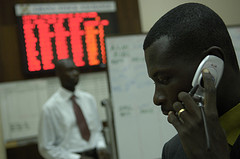
Sophisticated Exports
What do call centers in Kenya, accounting companies in Sri Lanka, and human resources firms in Abu Dhabi have in common? From the surface, perhaps not much; but from…

What do call centers in Kenya, accounting companies in Sri Lanka, and human resources firms in Abu Dhabi have in common? From the surface, perhaps not much; but from…
For the 600 million people living in fragile and conflict affected economies, the threat of relapsing into violence and slipping into deeper poverty is a reality they must face…
Commodity prices are experiencing a lot of volatility right now, with food and oil prices nearing record highs. But what about the medium-term? The answer is fundamental for developing…
The last 20 years have seen a growing engagement between development and human rights practitioners. But are we still mainly talking past each other? Or has there been valuable…
There has been an ongoing debate on the future need for foreign aid—a debate made ever more crucial by the current budget constraints in many countries as a result…
Last week’s State of the Union underscored the debate surrounding public spending as a measure to stimulate economic growth. President Barrack Obama argued that to “win the future” the…
While the rich world puts its post-crisis house in order, developing countries as a whole are becoming the new engine of global growth. But switching locomotives is never free of risk.
From the Latin American Debt crises to East Asia’s financial sector turmoil, past macroeconomic shocks have traditionally affected women differently than men. Such asymmetries are even more evident in…
Why is it that some countries are more developed than others? A country is “less developed” not only because it lack inputs (labor and capital) but because it uses…
The Day After Tomorrow: A Handbook on the Future of Economic Policy in the Developing World (at the Wilson Center) https://youtu.be/bAu0GhuwX7Y Economists Otaviano Canuto (right) and Marcelo Giugale pointed to a major…
This is the fourth in a series of blogs where we take a look at the issues and the countries that will be at the forefront of the development…
This is the third in a series of blogs where we take a look at the issues and the countries that will be at the forefront of the development…
This is the second in a series of blogs where we take a look at the issues and the countries that will be at the forefront of the development…
While the rich world puts its house in order, developing countries are becoming a new engine of global growth and a pulling force for advanced economies, says a new book by World Bank economists. According to The Day After Tomorrow: A Handbook on the Future of Economic Policy in the Developing World, almost half of global growth is currently coming from developing countries. As a group, it is projected that their economic size will surpass that of their developed peers in 2015.
As the global stock of ideas expands and diffuses across and within countries, technological learning is poised to become an even more important determinant of growth through its impact on innovation. This note reviews global trends that make a policy focus on technological learning and innovation more important than ever for developing countries. The note explores how the recent global financial crisis may affect these trends and outlines several implications of these trends for innovation policy moving forward. Developing countries would benefit from an increased policy emphasis on technological learning and the adoption of more efficient existing technologies to generate more and better jobs and higher standards of living.